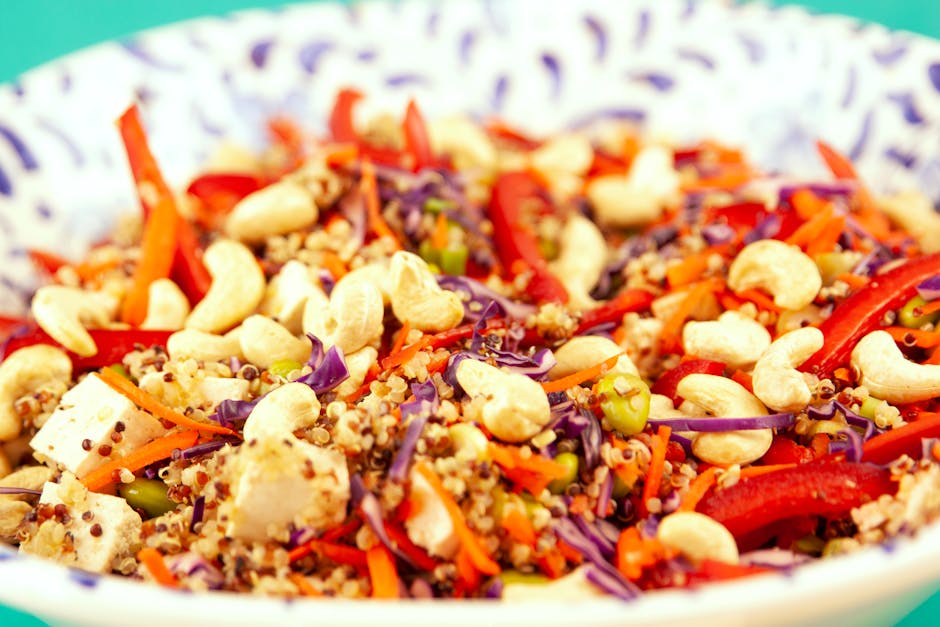Vegan Made Simple: Your Ultimate Handbook for Transitioning to a Cruelty-Free, Sustainable, and Healthy Way of Life
Start on a cruelty-free, sustainable, and healthy lifestyle with the ultimate guide to simplifying veganism. Discover the reasons to adopt a vegan lifestyle, from supporting animal welfare to combating cruelty in factory farming. Learn about vegan nutrition basics, incorporating iron-rich foods like lentils and calcium sources such as fortified plant milks. Stock up on essential pantry staples like quinoa and almonds for nutritious meals. Make easy swaps to dairy alternatives and explore vegan dining options. With meal prep tips and beauty recommendations, kickstart your eco-conscious journey. Uncover the impact of veganism on the environment and find support within the vibrant vegan community.
Key Takeaways
- Incorporate iron-rich foods like lentils and spinach for essential nutrients.
- Choose dairy alternatives like almond or oat milk for a cruelty-free lifestyle.
- Opt for calcium sources such as fortified plant milks and almonds for bone health.
- Prioritise protein-rich plant foods like legumes and grains for a balanced diet.
- Meet B12 needs through fortified foods or supplements for optimal health.
Why Go Vegan?

If you’re considering a vegan lifestyle, understanding the reasons behind going vegan is essential to making an informed decision. When it comes to animal welfare, choosing a vegan lifestyle means taking a stand against the mistreatment of animals in the food industry. By opting for plant-based alternatives, you actively contribute to reducing the demand for animal products, thereby promoting a more compassionate and ethical treatment of animals. Imagine a world where animals are no longer subjected to the cruelty of factory farming, simply because of the choices you make daily.
In addition to animal welfare, embracing a vegan lifestyle also plays an important role in environmental sustainability. The meat and dairy industries are major contributors to deforestation, greenhouse gas emissions, and water pollution. By going vegan, you reduce your carbon footprint and help conserve essential resources like water and land. Your decision to choose plant-based options over animal products directly impacts the health of our planet, paving the way for a more sustainable future for generations to come.
In essence, going vegan isn’t just a personal choice; it’s a powerful statement for animal rights and environmental preservation. By alining your actions with your values, you become an advocate for positive change in the world. Embrace the journey towards a cruelty-free lifestyle, knowing that each plant-based meal you enjoy makes a significant difference.
Vegan Nutrition Basics

When it comes to vegan nutrition basics, you need to focus on essential nutrient sources and protein-rich plant foods. These elements are key to ensuring you meet your nutritional needs while following a cruelty-free lifestyle.
Essential Nutrient Sources
To guaranty you’re meeting your nutritional needs on a vegan diet, focus on incorporating a variety of plant-based sources rich in essential nutrients. Here are four key points to take into account for nutrient absorption and effective meal planning:
-
Iron: Include foods like lentils, beans, tofu, and spinach to make sure you get adequate iron intake.
-
Calcium: Opt for fortified plant milks, leafy greens, almonds, and sesame seeds to support bone health.
-
Omega-3 Fatty Acids: Incorporate flaxseeds, chia seeds, walnuts, and hemp seeds for essential omega-3s.
-
Vitamin B12: Consider fortified foods or supplements to meet your B12 needs, as it’s primarily found in animal products.
Protein-Rich Plant Foods
Promote a balanced vegan diet by prioritising protein-rich plant foods that offer essential nutrients for your overall health and well-being. Incorporate protein-packed legumes like chickpeas, lentils, and black beans into your meals. These legumes not only provide a good source of protein but also offer fibre, iron, and other crucial nutrients.
Nutrient-dense grains such as quinoa, brown rice, and oats are also excellent choices to boost your protein intake. These grains are versatile and can be used in various dishes to increase the nutritional value of your meals. By including a variety of protein-rich plant foods in your diet, you can make sure that you’re meeting your body’s protein requirements while enjoying a diverse and delicious range of foods.
Vegan Pantry Staples

Stock your pantry with essential vegan staples like grains, legumes, nuts, seeds, and plant-based proteins to create a foundation for delicious and nutritious meals. Here are four key items to always keep stocked in your kitchen for a seamless vegan cooking experience:
-
Quinoa: This versatile grain is a complete protein source and a great alternative to rice, providing a nutty flavour and a satisfying texture to your dishes.
-
Chickpeas: Whether canned or dried, chickpeas are a fantastic source of plant-based protein and can be used in salads, curries, stews, or even roasted as a crunchy snack.
-
Almonds: Packed with healthy fats, fibre, and protein, almonds are perfect for snacking, making homemade almond milk, or adding a crunchy topping to salads and desserts.
-
Chia Seeds: These tiny seeds are rich in omega-3 fatty acids and can be used to make chia pudding, as an egg substitute in vegan baking, or sprinkled over yoghurt and smoothy bowls for added nutrition.
Easy Vegan Swaps

Looking to make the switch to a vegan lifestyle? Start with easy swaps like choosing dairy alternatives for milk, meat substitutes for protein, and egg replacers in baking.
These simple changes can help you shift smoothly to a cruelty-free way of eating without sacrificing taste or convenience.
Embrace these vegan alternatives and discover a whole new world of delicious plant-based options.
Dairy Alternatives for Milk
Switching to dairy alternatives for milk is a simple and effective way to embrace a vegan lifestyle. Here are four key points to ponder:
-
Nutritional benefits: Dairy alternatives like almond, soya, or oat milk can offer similar nutrients to cow’s milk, such as calcium, vitamin D, and protein.
-
Flavourful recipes: These alternatives can be used in a variety of delicious recipes, from creamy smoothies to fluffy pancakes, adding a unique taste to your meals.
-
Easy availability: Most grocery stores now carry a wide selection of dairy-free milk options, making it convenient to make the switch.
-
Environmental impact: Opting for plant-based milk helps reduce greenhouse gas emissions and water usage compared to traditional dairy production methods.
Making the switch to dairy alternatives isn’t only beneficial for your health but also for the planet.
Meat Substitutes for Protein
Consider incorporating delicious and nutritious meat substitutes into your meals for an easy shift to a plant-based diet.
Plant-based proteins like tofu, tempeh, seitan, and legumes are fantastic meat alternatives packed with the protein your body needs.
Tofu, made from soybeans, is versatile and can absorb any flavours you cook it with.
Tempeh, another soya-based product, has a chewy texture and nutty flavour, perfect for stir-fries or sandwiches.
Seitan, made from wheat gluten, has a meaty texture and is great for dishes like stews and roasts.
Legumes such as lentils, chickpeas, and black beans aren’t only high in protein but also rich in fibre and various nutrients.
Experiment with these meat substitutes to create delicious and satisfying plant-based meals.
Egg Replacers in Baking
For successful vegan baking, try out these easy egg replacers that work seamlessly in your favourite recipes.
-
Flavourful substitutes like applesauce, mashed bananas, or punkin puree can add moisture and binding properties to your baked goods.
-
Baking challenges can be overcome by using flax or chia seeds mixed with water to create a gel-like texture that mimics eggs.
-
Aquafaba, the liquid from canned chickpeas, is a versatile egg replacer that can be whipped into stiff peaks for meringues or used as a binder in recipes.
-
Commercial egg replacers such as powdered mixes or liquid alternatives are convenient options that provide reliable results without compromising taste or texture.
Experimenting with these egg replacers will open up a world of vegan baking possibilities while keeping your treats delicious and cruelty-free.
Dining Out Vegan

Exploring vegan dining options can lead to discovering new and delicious plant-based dishes. When dining out as a vegan, you may encounter a variety of exciting choices that cater to your lifestyle. From vegan fast food options like veggie burgers, felafel wraps, or veggie burritos to more upscale vegan restaurants offering gourmet dishes made from fresh, cruelty-free ingredients, the culinary world is yours to explore.
If you have a sweet tooth, don’t worry – there are plenty of vegan dessert options available at many restaurants. Indulge in dairy-free ice cream, vegan chocolate cake, or fruit sorbets for a satisfying end to your meal. Some places even offer creative vegan twists on classic desserts like cheesecakes and brownies, so you won’t feel like you’re missing out on anything.
When dining out, don’t be afraid to ask questions or make special requests to make sure your meal meets your vegan standards. Most restaurants are happy to accommodate dietary preferences and can often customise dishes to suit your needs. Remember, being vegan doesn’t mean sacrificing flavour or variety – it’s about exploring new tastes and enjoying a cruelty-free way of eating. So go out, try new vegan dishes, and savour every plant-based bite!
Vegan Meal Prep Tips

When planning your vegan meals for the week, streamline your process with practical meal prep tips for a hassle-free and delicious plant-based experience. To make your shift to a vegan lifestyle easier and more enjoyable, consider the following tips:
-
Batch Cooking: Dedicate a day to prepare large quantities of staple foods like grains, legumes, and vegetables. Cook once and enjoy multiple meals throughout the week without the daily cooking hassle.
-
Keep It Budget-Friendly: Plan your meals around affordable ingredients such as beans, lentils, rice, and seasonal fruits and vegetables. Buying in bulk and opting for store-brand products can also help you save money while eating healthily.
-
Prep in Advance: Spend some time each week washing, chopping, and storing your fruits and veggies in air-tight containers. This makes it easier to grab healthy snacks or assemble quick meals when you’re short on time.
-
Get Creative with Leftovers: Don’t let your leftovers go to waste! Transform them into new dishes by adding fresh ingredients or incorporating them into salads, wraps, or stir-fries.
Vegan Beauty and Fashion

Embracing a cruelty-free lifestyle goes beyond just food choices; adopting vegan beauty and fashion empowers you to aline your values with your everyday decisions. When it comes to vegan skincare, you’re choosing products that are free from animal-derived ingredients and not tested on animals. By opting for cruelty-free skincare, you show compassion not only to animals but also to your skin, as many vegan products are packed with natural and nourishing ingredients that can benefit your complexion.
In the domain of sustainable fashion, you’re making a conscious choice to support brands that prioritise ethical practises and environmental sustainability. Sustainable fashion focuses on reducing waste, using eco-friendly materials, and ensuring fair labour practises throughout the supply chain. By embracing sustainable fashion, you’re not only making a style statement but also contributing to a more eco-conscious and socially responsible industry.
Vegan Environmental Impact

To fully understand the impact of veganism on the environment, consider the far-reaching consequences of your lifestyle choices beyond just food and personal care products. Embracing a vegan lifestyle can greatly reduce your carbon footprint and contribute to environmental sustainability in various ways:
-
Reduced Carbon Emissions: By opting for plant-based foods over animal products, you can lower the greenhouse gas emissions associated with livestock farming. This shift helps combat climate change and minimises your individual impact on the planet.
-
Preservation of Natural Resources: Veganism promotes the efficient use of resources like water and land. Plant-based diets generally require fewer resources to produce, making them more sustainable in the long run.
-
Protection of Biodiversity: Choosing vegan alternatives can help protect biodiversity by reducing deforestation for animal agriculture. This preservation of ecosystems is essential for maintaining a healthy and balanced environment.
-
Mitigation of Pollution: Animal agriculture is a significant contributor to water and air pollution. By adopting a vegan lifestyle, you can play a part in reducing pollution levels and promoting cleaner environments for all living beings.
Vegan Community Support

Joining the vegan community provides invaluable support and resources for those making the switch to a cruelty-free lifestyle. Vegan support groups and online forums offer a safe space to ask questions, seek advice, and share experiences with like-minded individuals on a similar journey. These communities can be a source of encouragement, motivation, and camaraderie as you navigate the challenges and triumphs of adopting a vegan lifestyle.
In vegan support groups, you can find a wealth of knowledge and expertise on topics ranging from nutrition and meal planning to ethical considerations and sustainable living practises. By engaging with others who share your values, you can feel empowered and inspired to stay committed to your decision to go vegan.
Moreover, vegan communities often engage in recipe sharing and offer opportunities for participating in cooking classes. These activities can help you explore new flavours, cuisines, and cooking techniques that aline with your cruelty-free principles. Whether you’re a seasoned chef or a beginner in the kitchen, these resources can enhance your culinary skills and make your vegan journey more enjoyable and fulfilling.
Frequently Asked Questions
Can I Still Meet My Protein Needs on a Vegan Diet?
Absolutely, you can meet your protein needs on a vegan diet. There are plenty of protein sources available like beans, lentils, tofu, tempeh, quinoa, nuts, and seeds.
How Can I Handle Social Situations as a New Vegan?
Managing social situations as a new vegan can be tricky. When eating out or at parties, look for veg-friendly options on the menu or offer to bring a dish to share.
Dealing with family and friends may require patience and understanding. Educate them about your choices without being preachy. Remember, it’s okay to stand your ground while still being respectful.
Surround yourself with supportive people who embrace your lifestyle.
Are There Any Vegan Alternatives to Leather?
Looking to swap out leather for eco-friendly options? You’re in luck! Vegan alternatives to leather are on-trend and abundant.
From stylish bags to chic shoes, you’ll find a plethora of fashion choices that aline with your values. Embrace faux leather, cork, or even pineapple leather for a cruelty-free and sustainable wardrobe.
Say goodby to animal products without sacrificing style. Choose compassion and fashion with these innovative alternatives.
What Are Some Easy Vegan Dessert Options?
Looking for some quick and budget-friendly vegan desserts? Well, you’re in for a treat!
Whip up a delicious fruit salad with a drizzle of maple sirup or indulge in a bowl of dairy-free chocolate pudding.
Don’t forget about the classic peanut butter and banana combo for a simple yet satisfying sweet fix.
These options will surely satisfy your cravings without breaking the bank. Enjoy indulging guilt-free in these tasty treats!
How Can I Make Sure My Kids Get All the Nutrients They Need on a Vegan Diet?
To guaranty your kids get all the nutrients they need on a vegan diet, consider nutrient supplements to fill any gaps.
School lunches can be packed with plant-based proteins like lentils, chickpeas, or tofu. Incorporate a variety of fruits, vegetables, whole grains, and nuts for a balanced diet.
Encourage your kids to try new foods and involve them in meal planning to make sure they’re getting the nutrition they require.
Conclusion
To sum up, going vegan is like embarking on a new chapter in your life’s story. By embracing a cruelty-free, sustainable, and healthy way of living, you’re not just helping yourself but also the planet and its inhabitants.
So, take the plunge, make the switch, and join the growing community of compassionate individuals making a difference. Your future self will thank you for it, and so will the world.
It’s time to write a new chapter in your journey towards a better, brighter tomorrow.
Contact us to discuss our services now!
